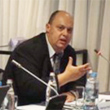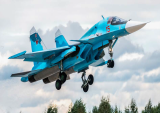
Russia’s Policy of Deception and Denial By Eugene Kogan, Tbilisi-based defence and security expert
A policy of deception and denial is the cornerstone of Russia‘s overarching strategy of confusion, paralysis and ultimately defeat of the opponent.
Consistency, conviction and perseverance are key words to describe the policy of deception and denial. The cases presented below shed light on the consistent pattern of President Vladimir Putin’s government to deceive others and depict Russia as the one that comes to the aid of the underdogs, whether in Georgia, Ukraine or elsewhere. Syria is a special case where Russia cannot abandon its military bases to aggressive Western powers. READ MORE
- EGF Editor |
Published on EGF: 10.09.2018
| Security
-
Tensions Rising In & Around Iran  By Benyamin Poghosyan, PhD, Executive Director, Political Science Association of Armenia
By Benyamin Poghosyan, PhD, Executive Director, Political Science Association of Armenia
President Trump’s decision to pull out from the Iranian nuclear deal has significantly increased tensions in and around Iran. The return of “regime change” policy will have profound implications on Iran and the Middle East. The Iranian economy is in steep decline with the sharp devaluation of the Iranian Rial and large-scale protest rallies in different regions. The rising prices of consumer products, shortages of water and problems related with mismanagement are fuelling the protests. READ MORE
- EGF Editor |
Published on EGF: 09.07.2018
| External Relations
-
Turkey's Post Elections Policy in the South Caucasus  By Benyamin Poghosyan, PhD, Executive Director, Political Science Association of Armenia
By Benyamin Poghosyan, PhD, Executive Director, Political Science Association of Armenia
Turkey's strategic alliance with Azerbaijan, trilateral co-operation including Georgia and its efforts to transform itself into a regional energy hub will continue to be the main features of the Erdogan government policy in the South Caucasus.
24 June 2018 was a big day for Turkish domestic politics. Turkey elected both the President and the Parliament. Given the sweeping constitutional changes approved in the April 2017 referendum, the new President has become an almighty figure in Turkey. Despite various assessments envisaging hard times for the incumbent Turkish President, Erdogan managed to win the race without entering into a possibly dangerous run-off. READ MORE
- EGF Editor |
Published on EGF: 03.07.2018
| External Relations
-
New Southern Gas Corridor Project Will Intensify the Regional Pipeline Race
 By Fuad Shahbazov, Baku-based independent regional security and defence analyst
By Fuad Shahbazov, Baku-based independent regional security and defence analyst
On May 29, Azerbaijan’s President Ilham Aliyev officially inaugurated the first phase of the long-awaited flagship project Southern Gas Corridor (SGC), through which Caspian natural gas from the Shah-Deniz II field will be transported to Europe. The new project consists of several pipeline networks that pass through Georgia and Turkey (via the Trans-Anatolian Pipeline, TANAP) and further through Greece, Albania and Italy (via the Trans-Adriatic Pipeline, TAP). As Shah Deniz Stage 2 is implemented, gas production will increase from 9 to 25 billion cubic meters (bcm) per year. READ MORE
- EGF Editor |
Published on EGF: 03.07.2018
| Energy
-
Launch of the TANAP Pipeline: Implications for the South Caucasus  By Benyamin Poghosyan, PhD, Executive Director, Political Science Association of Armenia
By Benyamin Poghosyan, PhD, Executive Director, Political Science Association of Armenia
On June 12, the official launch ceremony of the TANAP pipeline was held in Turkey. TANAP is the key component of the Southern Gas Corridor, which should bring Azerbaijani gas to Europe, circumventing Russia. At the initial stage, annually 6 billion cubic meters of gas will be supplied to Turkey and another 10 billion through South Eastern Europe mainly to Italy. In later stages, the volume may be increased due to additional gas from the Azerbaijani Shah Deniz field, or potentially involving other gas sources such as Iraq and Turkmenistan. READ MORE
- EGF Editor |
Published on EGF: 27.06.2018
| Energy
-
Is America Changing the European Power Play?  By George Vlad Niculescu, Head of Research, the European Geopolitical Forum
By George Vlad Niculescu, Head of Research, the European Geopolitical Forum
When at the NATO summit in Brussels, on 25 May 2017, president Donald Trump didn’t say that one sentence committing America to continue standing by article 5 of the NATO Charter, he raised eyebrows across Europe. At that time, everyone remembered that candidate Donald Trump raised serious suspicions that his presidency might lead to the end of the West, as we knew it. Nevertheless, everyone who has ever believed in the strength of the Trans-Atlantic link and in the soft power of the Euro-Atlantic values secretly hoped that the end of Pax Americana in Europe wasn’t that close. READ MORE
- EGF Editor |
Published on EGF: 26.06.2018
| External Relations
-
Is this the end for the post-Cold War world order?  By Benyamin Poghosyan, PhD, Executive Director, Political Science Association of Armenia
By Benyamin Poghosyan, PhD, Executive Director, Political Science Association of Armenia
The G7 and Shanghai Co-operation Organisation summits last week highlighted the decline of western dominated post-cold war order, and a growing role for regional powers in their respective zones of influence.
Last week world attention was focused on two key international summits - the G7 in Canada and the Shanghai Cooperation Organization (SCO) meeting in China. The first was a gathering of advanced economies, with established democratic institutions and traditions, the second a summit of the "rising others", including two giants - China and India - as well as Russia, desperately vying for a seat at the table of global powers. READ MORE
- EGF Editor |
Published on EGF: 19.06.2018
| External Relations
-
The Limits of Changing Armenian Foreign Policy after the “Velvet Revolution”  By Benyamin Poghosyan, PhD, Executive Director, Political Science Association of Armenia
By Benyamin Poghosyan, PhD, Executive Director, Political Science Association of Armenia
The April – May 2018 “Velvet Revolution” in Armenia caught many by surprise. A few, if any, domestic or foreign experts anticipated such a quick removal from power of the long-term leader Serzh Sargsyan and the Republican Party. Many questions regarding the factors which facilitated the revolution remained unanswered. However, protest leader Nikol Pashinyan has been elected Prime Minister on May 8, and he will hold that position at least until the snap Parliamentary elections, either in November 2018 or in spring 2019. READ MORE
- EGF Editor |
Published on EGF: 12.06.2018
| External Relations
-
Pashinyan's timely visit to Georgia  By Benyamin Poghosyan, PhD, Executive Director, Political Science Association of Armenia
By Benyamin Poghosyan, PhD, Executive Director, Political Science Association of Armenia
Armenian-Georgian relations are friendly, regardless of some tensions under the surface. During his visit to Georgia, prime-minister Nikol Pashinyan should focus on pragmatic issues related to transport corridors.
Georgia plays a key role in Armenian foreign policy. Given the absence of relations with Azerbaijan and Turkey Georgia is one of only two gateways for Armenia to connect with the world. Approximately 70 percent of Armenian foreign trade passes through Georgia. The country is the only channel for Armenian business to reach both Russia - a critical market for Armenian exports, and Europe - another key spot for Armenian business especially after 2017 November signature of Comprehensive and Enhanced Partnership Agreement with the EU. READ MORE
- EGF Editor |
Published on EGF: 04.06.2018
| External Relations
-
Russian Aerospace Forces and the Syria Campaign: An Assessment  By Eugene Kogan, Tbilisi-based defence and security expert
By Eugene Kogan, Tbilisi-based defence and security expert
There is no doubt whatsoever that the lion’s share of the Russian defence budget funds for the years 2011–20 was allocated to the Aerospace Forces (VKS – Vozdushno-Kosmicheskiye Sily) namely, RUR4 trillion out of total RUR19 trillion 1 (or 21 per cent of budget sum US$ 337 billion). The level of financial allocations clearly highlighted the armed forces priority in the eyes of President Vladimir Putin and the top military brass. The forces proved to be a crucial tool in the hands of President Putin and the military establishment. And the VKS continue to play an important role in President Putin’s overall military strategy in particular after a successful operation in Syria. READ MORE
- EGF Editor |
Published on EGF: 28.05.2018
| Security
-
